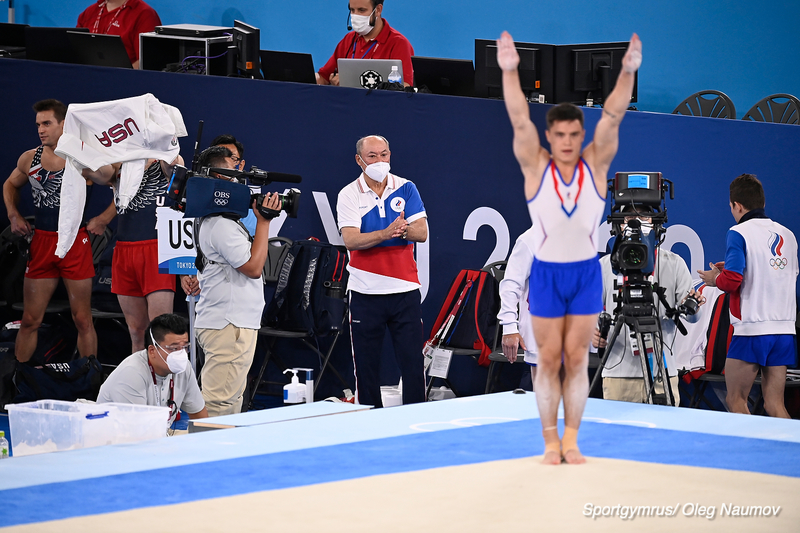The head coach of the Russian men’s team Valeri Alfosov has waited for this moment a long time and planned for it to happen, despite the injuries that plagued the team in the past year. His decision to put a three-eventer Denis Abliazin and an injured Artur Dalaloyan on the team seemed crazy at first but ultimately worked out. Alfosov told the media that this Olympic gold medal is the pinnacle of his career as a coach:
“There are happy days in a life of every person. It can be a birth of a child and many other things. But if we’re talking about the coaching profession, then the pinnacle of any coach’s career is bringing their team to win the Olympic gold. It’s the biggest achievement, there’s nothing else. I’ve been moving towards this day for a very long time. Considering my work with this team, we started preparing together for the 2012 Olympics. London and Rio are behind us and now we’re in Tokyo.”

In London, the Russian team finished at a disappointing 6th place in the final. Two of the Tokyo team gymnasts, Denis Abliazin and David Belyavskiy, were on that team. Abliazin managed to leave London with a vault silver and floor bronze, while Belyavskiy did not win any individual medals and finished 5th in the all-around final despite qualifying in the second place. Three of the gymnasts in Tokyo were on the silver-medalist team in Rio – Nikita Nagorny joined Abliazin and Belyavskiy. Artur Dalaloyan had to miss the Rio Olympics due to an injury. At the time, the team could hardly contend with the gold-winning Japanese team and lost to them by several points. Alfosov was worried that it would be hard to compete against Japan at home:
“We were, of course, worried about how unbiased the judges would be evaluating our routines. After all, we are competing in Asia now and against very strong teams from Japan and China. We knew that these teams would come to fight, we prepared for it and calculated all the variants. But we never get publicly upset with the judges. We accept their scores and think that their work will be on their conscience. Coaches have a right to disagree but our sport is subjective to a certain degree.”
Russia lost most of their lead over Japan and China during the fifth rotation and Alfosov said they waited for the scores from Lin Chaopan and Hashimoto Daiki, the last gymnasts to compete on their respective teams, to decide which routine Nikita Nagorny would perform:
“Starting from parallel bars, we kept calculating all the options. That’s why Nagorny was listed last on floor. Nikita had two routines prepared, one with the difficulty of 6.2 and good execution and another with the difficulty of 6.8. If by Nikita’s turn we had been losing and had to chase the other teams, he would have done the more difficult routine in order to get 15+ points for it. But by his turn we already knew that it was enough to get a score slightly below 15 points and it would be enough in order not to lose to Japan and China.”
Artur Dalaloyan competed on all six events both in the qualification and the team final. He also plans to compete in the all-around final on Thursday. Alfosov says that at the moment, Dalaloyan feels fine and is still expected to compete:
“Our doctors checked Artur last night and this morning, they administered the treatments. He’s feeling fine, he’s in a fine mood, there are no issues so far. We still have today and tomorrow and will talk to him. If there will be any issues, we will try to solve them. For now, everything’s more or less fine. I think that Artur won’t need another surgery after the Games. I think it will not come to that because the doctors cleared him and everything is going fine so far. We hope that in the fall, Artur will train the all-around for the World Championships. I think everything will work out fine for him.”
While yesterday’s final was emotional, Alfosov is trying to stay restrained because there are more competitions ahead – Russian men will compete in every individual final:
“I managed to fall asleep fine last night [after the final]. Of course, I still have energy and emotions because we still have lots of work to do at these Olympics. Everything yesterday was memorable. It was really interesting to see the fight on every event. The pressure started rising on vault. We still had parallel bars, high bar, and floor to go. That’s when the drama started and gymnasts started making mistakes. But, overall, it often happens in gymnastics that equally strong gymnasts compete against each other and the nerves decide everything. Whoever is more resilient and better prepared mentally wins.”
Photo: Russian Artistic Gymnastics Federation
Support Gymnovosti on Patreon from only $1 a month and help us bring to you even more awesome gymnastics coverage!



